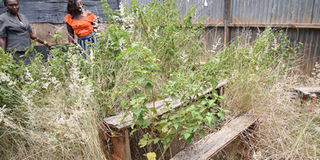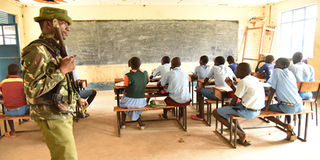Premium
Schools turned into cattle barns as raiders rule the roost

A classroom at Kapindasum Primary School. CHEBOITE KIGEN | NATION
The path to Kapindasum Primary School is rugged and sandwiched between a thicket that runs for kilometres across winding hills dotted with empty houses and a loud silence.
About three years ago, bandits raided the area.
Singing war songs, they ordered families to vacate and leave them with water and pasture to graze the animals they had taken.
“They closed Kapindasum before doing the same to neighbouring schools,” deputy headteacher Eric Kigen said.
The raiders then turned Ngeleche Primary School into a barn.
Some classrooms were converted into cattle sheds while others housed goats.
The staffroom became a kitchen.
Not satisfied, the bandits moved to Ramacha, Katilomwo and Loromoru primary schools and vandalised them.
“They took over the schools and used them as launch pads for more attacks,” Mr Kigen told the Nation.
As a result of the insecurity, all the schools in the area shut down.
Deep in Baringo County – the home of Kenya’s longest serving President Daniel Toroitich arap Moi – are many public institutions that heavily armed men wearing sandals made of worn-out car tyres have converted into raiding grounds.
The men have little or no education and do not seem concerned.
“This hurts us badly. We have a government that does not care about our security and the future of our children,” Mr Paul Lokomor, a teacher, told the Nation.
The schools are in Mukutani ward, Baringo South constituency.
THREE REOPENED
In January, Devolution Cabinet Secretary Eugene Wamalwa, Baringo Governor Stanley Kiptis and Baringo South MP Charles Kamuren reopened three of the four schools for the first time in three years.
The affected primary schools are Arabal, Nosukuro, Mukutani and Kapindasum.
“Before the team arrived, the last senior government official to visit the area was the late Interior CS Joseph Nkaissery, who landed at Ngeleche Primary School. He looked at the school that had been converted into a barn and with despair, left in a huff,” Mr Lokomor said.
Mr Nkaissery died in 2017.
Like most parts of the wild north and the volatile Rift Valley, communities in Mukutani do not see eye to eye.
Mukutani ward is in a region claimed by both Pokot herders and Ilchamus mixed farmers.
The dispute has lasted more than a century. In 1907, the British colonial government declared Mukutani a shared trading centre.
A few years ago, the main concern was access to pasture and sharing River Kapindasum – the only permanent one in the area.
The conflict has, however, escalated to where exactly Mukutani is supposed to be geographically.
The quest for answers to that question has been disastrous, resulting in the deaths of hundreds in the past 10 years, according to local leaders.
DIFFERING OPINION
With the Pokot saying it is in East Pokot Sub-County and the Ilchamus insisting Mukutani is in Baringo South and no political or government solution in sight, guns and poisoned arrows rule the day.
The conflict that started in Arabal – some 50 kilometres south – between the Pokots and the Tugen years ago reached Mukutani in April 2016 with an early morning attack that left 11 dead.
Some 427 families fled to Eldume, about 70 kilometres north.
More than three years after the attack, Mukutani remains a ghost town. Even stray dogs appear out of place.
Shops have been vandalised while residential houses have become breeding grounds for mosquitoes and wild animals.
This is happening as the grass, on which the communities could not agree whose cows should graze, continues to waste away.
It is here that Kapindasum Primary School still stands.

Kapindasum Primary School was closed in November 2018 following frequent bandit attacks. CHEBOITE KIGEN | NATION
The school is near River Kapindasum and in the middle of what has now become a forest.
In defiance of bullet holes on doors, windows, water tanks and walls, the school soldiers on.
The government has sent 13 Rapid Police Deployment Unit officers to repel anyone who might raid the school.
“The neighbouring schools closed due to insecurity but we decided to remain. If we don’t educate these children, they will end up picking up guns. It is these educated children who will change the society,” Mr Kigen said.
There are no lower classes. It begins from Standard Five to Eight.
“There are no schools nearby. We can only take learners who can flee for their lives in case of an attack. Even during lessons, one pupil remains outside, on the lookout for danger. It could make the difference between life and death,” Mr Kigen said.
Before the incessant bandit attacks, the school had more than 400 pupils, but the number has dropped to 67.
The pupils are allowed to wear uniforms from their previous schools.
It is this colourful mix of uniforms that best explains what can happen to a society when guns and politics are the only means of settling disputes.
The Nation team counted 16 different uniforms.
This place will never change if we all flee
To spot signs of danger in good time, the staffroom has been moved to a shed at the centre of the school.
Every teacher sits at a strategic location facing outside.
At 3pm daily, the pupils are escorted by police officers to River Kapindasum to fetch water.
It is a risky routine that is restricted to a maximum of 15 minutes in order to avoid creating unnecessary attention as that can turn the learners into easy targets.
Though security has improved, there are occasional attacks.
Very few teachers would want to be deployed to Kapindasum Primary School.
“The seven teachers working here do not take it as a job. It is a sacrifice. They want local children to be like the rest in the country. This place will never change if we all flee,” Mr Kigen said.
Despite the security measures, danger always lurks in the shadows.
About two days before the Nation team arrived, raiders stole 15 cows from a village on a hill overlooking the school. The raiders and the animals passed by the school.
The RDU officers had to make a difficult decision between pursuing the attackers and putting the school at the risk of a retaliatory attack and calling for assistance.
SOUGHT HELP
For the sake of the school, they called for assistance from a General Service Unit camp, some 30 kilometres away.
Last year, one of the teachers was killed on his way to Cheromongei shopping centre.
Mr Philip Kemei, an English and Social Studies teacher, had just wound up his lessons when he encountered bandits who shot him three times in the chest and stomach.
The remaining teachers recall hearing shots.
“A person who was near the school came and asked if we had heard the gunfire. That is when it hit us that our colleague had headed in that direction,” Mr Lokomor said.
In spite of all these challenges, some 17 candidates sat the Kenya Certificate of Primary Education examination last year.
The school had a mean score of 297. The best candidate scored 355 marks out of a possible 500.
The administration says the school is the only hope for peace in Mukutani Ward.
“Kapindasum school is the only way out of cattle rustling,” the deputy headteacher said.
“When that happens, locals will realise nothing good can come out of killing and stealing.”






